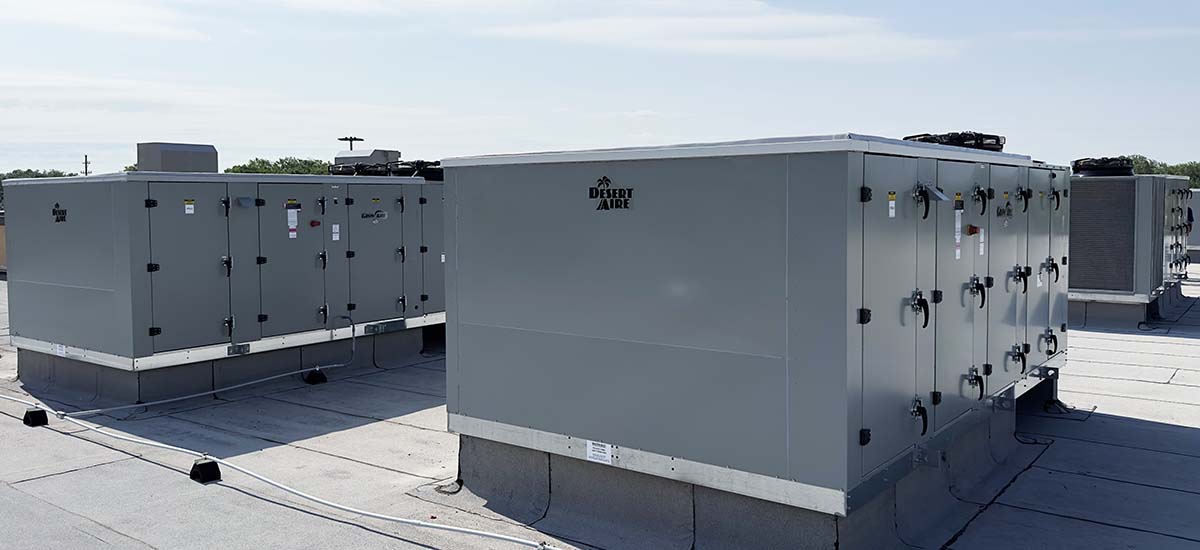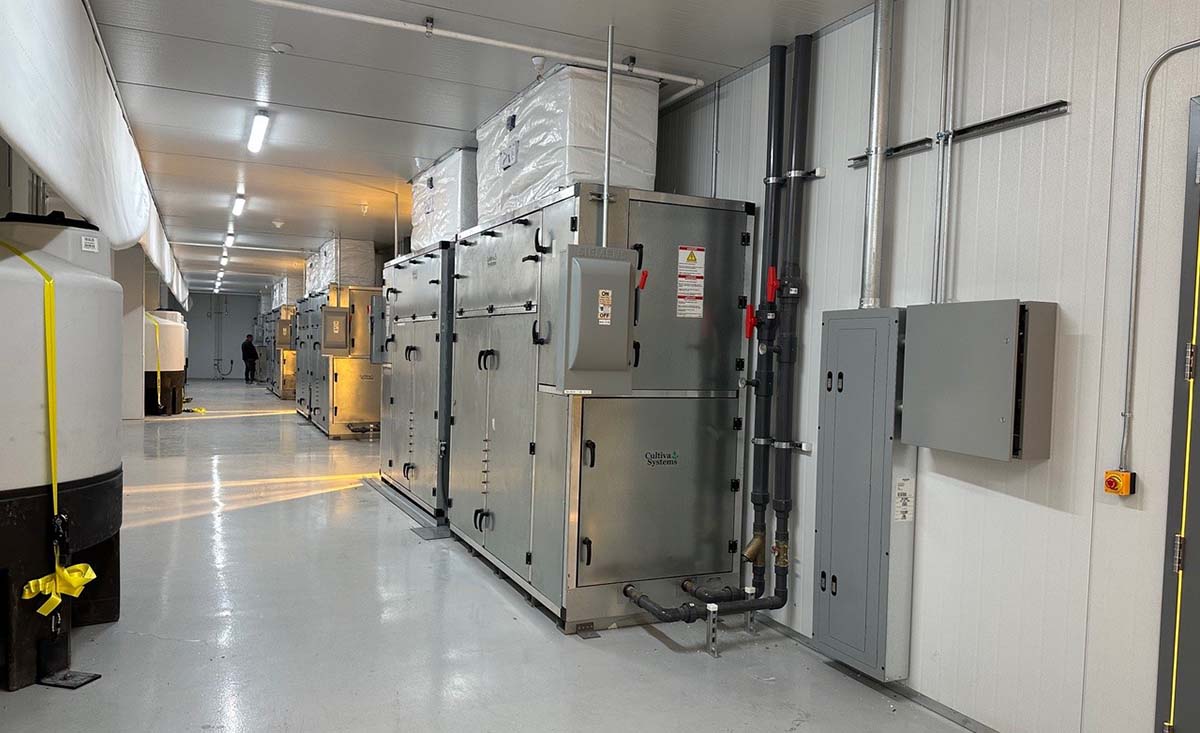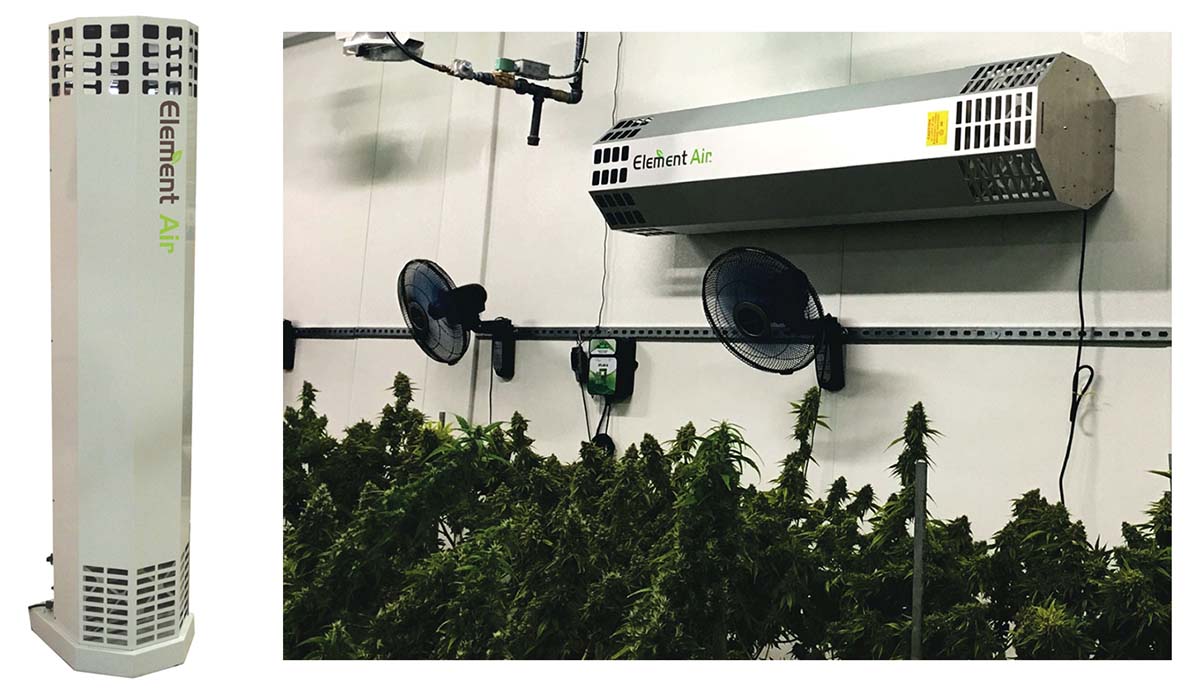“It’s not the heat, it’s the humidity.”
Most of us have heard that old adage, especially during summertime hot spells like the one that plagued much of the country in June.
When it comes to indoor agriculture, though, it’s both: Temperature and humidity, in the right combinations and at the right time for each particular type of plant, are crucial for the high crop yields, whether kale or cannabis, that make indoor farming profitable.
Humidifiers and dehumidifiers make up a huge proportion of the equipment designed for the indoor agriculture HVAC market.
“That’s what growers pay for,” said Sean McCarthy, general manager at Anden, which specializes in humidification and dehumidification products for indoor agriculture. “They’re buying control of their operation with humidifiers and dehumidifiers.”
Indoor HVAC products are also designed and built for a demanding environment, said McCarthy and Chip Seidel, head of business development at Desert Aire and formerly chief of its indoor agriculture division.
“We’ve never seen applications as rigorous as indoor agriculture for HVAC equipment,” Seidel said. “It’s constantly running, and it’s constantly changing.” Desert Aire’s GrowAire and GreenAire product lines offer equipment that growers use to control temperature, airflow, and humidity.
Precise Humidity
Plants need light, CO2, and nutrients, typically from the soil, that are carried into them by water through the process of transpiration. Most of that water evaporates from the plants during the last stage of transpiration, but if the humidity in the growing space is too high, Seidel explained, evaporation is hindered, slowing transpiration and the growth of the plant.
Plants also need different levels of humidity during different phases of their growth cycles; when small, they typically thrive in somewhat higher humidity, but benefit from drier air when they start to mature, he said.
Both Anden and Desert Aire offer equipment that lets growers precisely control humidity at levels that are optimal for what they’re growing, enabling them to increase crop yields.
Anden’s A710V3 dehumidifier, for example, has what the company calls variable-speed, low-grain refrigerant technology (VLGR), a patented system that varies the rate of dehumidification according to the load conditions of the growing environment. Changes in those conditions, such as when people walk in, the lights go off or on, or the a/c starts up, will trigger changes in the dehumidification rate, McCarthy said.
McCarthy compared VLGR to a variable-refrigerant flow (VRF) heating and cooling system. “We do the same thing, only we’re pulling out moisture” and varying that process according to changing conditions, he said.
The A710V3 can remove up to 710 pints of water a day at 80°F and an RH of 60%.
The most popular GrowAire product, Seidel said, is a 30-ton packaged unit that controls humidity as well as temperature and airflow. GrowAire units offer trademarked VPDsnyc technology (the VPD stands for vapor pressure deficit) that maintains optimal temperature and humidity.

HIGH CAPACITY: Thirty-ton GrowAire packaged units, from Desert Aire, installed on the roof of a grow facility. A grow room of 1,500 square feet might have two of these units, a Desert Aire representative said. (Courtesy of Desert Aire)
Indoor agriculture can require HVAC capacities, Seidel said, that are many times that of residential buildings. A grow facility with 1,500-square-foot rooms, he said, might have two 30-ton units per room.
Seidel said GrowAire also has other technologies that add to the value of its equipment, such as a CO2-dispersing system and an evaporator coil coating that prevents the equipment’s heavy metals from leaching into condensate, meaning that water can be safely recycled. “That’s a huge water-saving component,” he said.
Addison is another player in the indoor agriculture HVAC market. Its MI Indoor Vertical System, said Vice President of Sales Steve Piccolo, is a self-contained modular unit specifically designed for indoor farming. The MI, Piccolo said, can cool, dehumidify, and heat a grow space according to the changing needs of the space.

VERSATILE SYSTEM: An Addision MI Indoor Vertical System installed in a grow operation. The unit is designed to cool, heat, and dehumidify an indoor growing space as needed. (Courtesy of Addison)
“It fits in the aisleway of a densely packed grow room and can be connected to a cooling water loop or remote air-cooled condenser,” Piccolo said. The MI uses technology to maximize the reheat that’s recovered from the refrigeration cycle, he said.
Addison and sister company United CoolAir also custom-build indoor agriculture equipment, based on specific requirements, for other labels.
Keeping Clean
Making sure contaminants such as bacteria, mold, and yeast are kept from growing plants is another important aspect of successful indoor agriculture.
Element Air air cleaners, from RGF Environmental Group Inc., offer continuous cleansing of the air inside growing spaces, said Robin Broderick, who works in global sales for the Element brand at RGF.
An Element Air cleaner — available as a freestanding tower or a wall-mounted unit — uses UV light to create airborne hydroxyl radicals, hydroperoxides, and superoxide ions, Broderick said.

IN THEIR ELEMENT: The Element Tower, left, and Element Wall Mount air cleaners. The units employ UV light to create hydroxyl radicals, hydroperoxides, and superoxide ions that safely clean the air in indoor growing operations. (Courtesy of RGF Environmental Group)
“This atmosphere oxidizes contaminants in the air with friendly oxidizers ... which revert back to oxygen and hydrogen after the oxidation process,” Broderick said. “No chemical residue or dangerous compounds are emitted from the system.”
An Element Air unit can reduce levels of airborne microbes and odors in a grow space by up to 99%, she added. “The unit was designed for grow-house applications and does not emit any visible light, allowing the unit to run 24/7,” Broderick said.
One Element Air Tower unit, Broderick said, can treat up to 12,000 cubic feet of grow space.
RGF also offers an Element Air HEPA filtration system, that, installed in an HVAC system or air-handling unit, can remove up to 99.97% of particles down to 0.3 microns in size, Broderick said.
Anden is also in on the air-cleansing game with a technology in its high-capacity steam humidifiers that traps the minerals in the water, keeping them from the mist going into the air, McCarthy said.
“When you put moisture into the air, if you don’t contain that, those minerals, they go into the air with the water, and then that can end up on the plant,” he said.
Industry Trends
The relaxation of marijuana laws across the country over the last dozen or so years has fueled growth in the market for indoor agriculture HVAC products, and cannabis operations make up a large proportion of that market. Recreational marijuana is now legal in 24 states, and medical marijuana in close to 40.
However, experts at equipment manufacturers say the indoor farming of fruits and vegetables is a market segment that’s expected to boom in the coming years.
“We think the big opportunity is going to be fruits and vegetables,” said Seidel, at Desert Aire.
“We have a long history in the mushroom growing industry and have recently been designing projects for enclosed lettuce farming,” said Piccolo, at Addison.
Anden’s McCarthy said the farm-to-table movement, increasing emphasis on locally grown produce rather than produce that’s shipped hundreds or even thousands of miles, and the indoor urban farming trend have all contributed to the growth in indoor fruit and vegetable farming.
“Non-cannabis indoor agriculture is expected to grow 15% a year through 2030,” said McCarthy, citing one study. “So it’s very much a growing segment of the market.”








